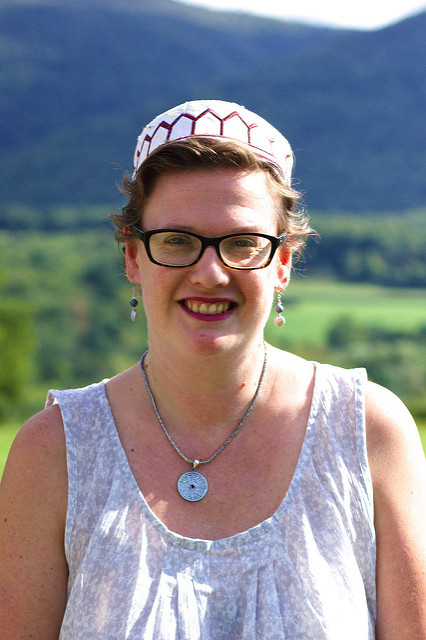This week’s Torah portion contains one of the most famous justice-related verses in Torah: “צֶ֥דֶק צֶ֖דֶק תִּרְדֹּ֑ף, / tzedek tzedek tirdof” — “Justice, justice shall you pursue!”
Although the parsha begins with the injunction to establish judges, this instruction — to pursue justice — doesn’t seem to be aimed solely at those whose job it is to judge. Even those who don’t practice justice for a living do judge others, whether or not our judgements have legal standing. So what does it mean to judge justly — not just for those who work in the justice system, but for the rest of us, too?
Torah offers some answers: don’t favor the rich because they’re powerful, or the poor because they’re the underdog. Here’s another: I think justice requires the ability to empathize with the other whom we are judging. This flows from the mitzvah at the very heart of the Torah (it’s the middle verse of the middle book): “You shall love your neighbor / your other as yourself.” This might seem like a tall order to put in front of America’s judges. We can’t mandate that judges cultivate love for the people who stand accused before them. But we can aspire to live with empathy as a basic mode of being in the world.
In Torah terms, tzedek is about rectification, setting something right. In this week’s portion we read that a person can’t be put to death on the testimony of a single witness. We read, too, about the establishment of “cities of refuge” where someone who committed accidental manslaughter can flee (thereby avoiding the endless cycle of retribution that might otherwise ensue — “you killed one of my people, so I’ll kill one of yours in return.”)
Both of these Torah teachings flow from empathy. We have to have empathy for the person accused of a capital offense, because otherwise it would be too easy to condemn them to death on a too-thin pretext. We have to have empathy both for victims of crime and for those accused of crimes, because otherwise it would be too easy to either ignore victims or pursue punitive action that isn’t actually just at all.
For me, the commandment to love my neighbor or my other as myself is a reminder that we all have one heart. No matter how different our life circumstances may be, how different our opportunities, how different our choices, we all have the same heart. And that in turn means that if I’m going to judge someone for their action (or their inaction), I need to be willing to place myself in that place of being judged, too.
Because we all have one heart, when I judge someone else, I’m judging my own heart as well. If I can stand up to the judgement I make of another, because I’m making that judgement with awareness that our hearts are fundamentally the same, then my discernment has the capacity to be justice. If I can’t stand up to the judgement I would place on someone else, then my judgement isn’t just. This places the onus on me to constantly be discerning: if I were in their shoes, would I be able to bear the judgement I’m now feeling, or do I need to replace my righteous indignation with something gentler? This kind of justice requires the one doing the judging to place her- or himself in the shoes of everyone who stands before them, accused and accuser alike.
Earlier this year when a judge sentenced Stanford University student Brock Turner, accused of rape, to six months in jail because “a longer sentence would have a severe impact on him” (see the letter written by the rape victim) — that judge was able to feel empathy for the accused, but not for the accuser. Meanwhile there’s ample evidence that empathy is less frequently shown to people of color who are accused of crimes than to white people accused of those same crimes — too often empathy flows toward the accuser rather than the accused.
The verse that begins “צֶ֥דֶק צֶ֖דֶק תִּרְדֹּ֑ף, / tzedek tzedek tirdof” — “Justice, justice shall you pursue!” — doesn’t end there. Torah continues, “in order that you may live and inherit the land which Adonai your God is giving you.” We pursue justice in order that we may truly live. In order to live life to its fullest, we need to work toward a world that is just, and thatrequires all of the empathy we can cultivate.
We’re approaching the Days of Awe, that season dedicated by Jewish tradition to the work of teshuvah, repentance or return. During the high holidays, we’re called to be conscious that every day we write the book of our lives with our choices, our actions, and our inactions. Could we ourselves stand the judging eye we often cast on others? Do we aspire to discern right from wrong in a way that places love and empathy at the center? The obligations of discernment and empathy fall on all of us. We must pursue them in order to truly live.
Rabbi Rachel Barenblat serves as co-chair of ALEPH: Alliance for Jewish Renewal and rabbi of Congregation Beth Israel in North Adams, MA. Author of several poetry collections, among them 70 faces: Torah poems (Phoenicia, 2011) and Open My Lips (Ben Yehuda, 2016), she has blogged as the Velveteen Rabbi since 2003.


